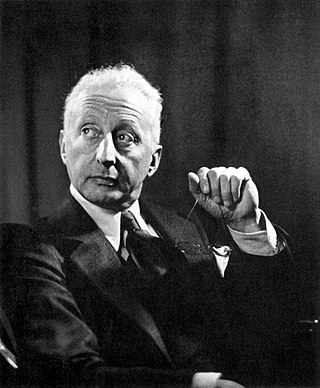
Jerome David Kern was an American composer of musical theatre and popular music. One of the most important American theatre composers of the early 20th century, he wrote more than 700 songs, used in over 100 stage works, including such classics as "Ol' Man River", "Can't Help Lovin' Dat Man", "A Fine Romance", "Smoke Gets in Your Eyes", "The Song Is You", "All the Things You Are", "The Way You Look Tonight" and "Long Ago ". He collaborated with many of the leading librettists and lyricists of his era, including George Grossmith Jr., Guy Bolton, P. G. Wodehouse, Otto Harbach, Oscar Hammerstein II, Dorothy Fields, Johnny Mercer, Ira Gershwin and Yip Harburg.

Otto Abels Harbach, born Otto Abels Hauerbach was an American lyricist and librettist of nearly 50 musical comedies and operettas. Harbach collaborated as lyricist or librettist with many of the leading Broadway composers of the early 20th century, including Jerome Kern, Louis Hirsch, Herbert Stothart, Vincent Youmans, George Gershwin, and Sigmund Romberg. Harbach believed that music, lyrics, and story should be closely connected, and, as Oscar Hammerstein II's mentor, he encouraged Hammerstein to write musicals in this manner. Harbach is considered one of the first great Broadway lyricists, and he helped raise the status of the lyricist in an age more concerned with music, spectacle, and stars. Some of his more famous lyrics are "Smoke Gets in Your Eyes", "Indian Love Call" and "Cuddle up a Little Closer, Lovey Mine".

A show tune is a song originally written as part of the score of a work of musical theatre or musical film, especially if the piece in question has become a standard, more or less detached in most people's minds from the original context.
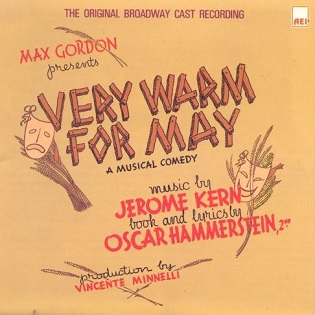
Very Warm for May is a musical composed by Jerome Kern, with a libretto by Oscar Hammerstein II. It was the team's final score for Broadway, following their hits Show Boat, Sweet Adeline, and Music in the Air. It marked a return to Broadway for Kern, who had spent several years in Hollywood writing music for movies, including Swing Time for Fred Astaire and Ginger Rogers.

J. Harold Murray was an American baritone singer and actor. For more than a decade, during the Roaring Twenties and the Depression Thirties, he contributed to the development of musical theater by bridging vaudeville, operetta and the modern American musical. The most popular American songs he introduced on Broadway included "Autumn in New York" ; "Let's Have Another Cup of Coffee" and "Soft Lights and Sweet Music" ; "Rio Rita", "The Kinkajou" and "The Rangers Song" ; and "Mandalay".

Oh, Lady! Lady!! is a musical with music by Jerome Kern, a book by Guy Bolton and P. G. Wodehouse and lyrics by Wodehouse. It was written for the Princess Theatre on Broadway, where it played in 1918 and ran for 219 performances. The story concerns an engaged young man, Bill, whose ex-fiancée arrives unexpectedly on his wedding day. Bill works to convince his old flame that he was not worthy to marry her, but his clumsy efforts do not make him look good to his new fiancée, whose mother already dislikes Bill. A couple of crooks cause further complications.

Lollipop is a musical comedy in three acts with book by Zelda Sears, lyrics by Sears and Walter De Leon, and music by Vincent Youmans. The show was produced by Henry W. Savage at the Knickerbocker Theatre, and opened January 21, 1924.
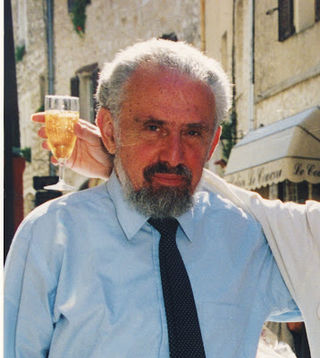
Gerald Martin Bordman was an American theatre historian, best known for authoring the reference volume The American Musical Theatre, first published in 1978. In reviewing an updated version of American Musical Theatre in 2011, Playbill wrote that the book had "altered the scope of American musical theatre history" and "remained the only book of its kind, and an invaluable one."

Stepping Stones is a "fantastical musical play" in two acts with book by Anne Caldwell and R. H. Burnside, lyrics by Anne Caldwell, and music by Jerome Kern. The show was produced by Charles Dillingham at the Globe Theater, and opened November 6, 1923.

The Bunch and Judy is a musical comedy in two acts with book by Anne Caldwell and R. H. Burnside, lyrics by Anne Caldwell, and music by Jerome Kern. The story centered on a Broadway starlet, who marries a Scottish nobleman, only to grow disenchanted and return to show business and the man she loves.

Ripples is a “new musical extravaganza” in two acts with book by William Anthony McGuire, lyrics by Irving Caesar and Graham John, and music by Oscar Levant and Albert Sirmay. The show was produced by Charles Dillingham at the New Amsterdam Theatre, and opened February 11, 1930.

Three Cheers is an American “new musical entertainment” in two acts, with a book by Anne Caldwell and R. H. Burnside, lyrics by Anne Caldwell, and music by Raymond Hubbell with additional lyrics by Lew Brown and B. G. DeSylva and additional music by Ray Henderson. The show was presented by Charles Dillingham and produced by R. H. Burnside at the Globe Theatre, and opened October 15, 1928.
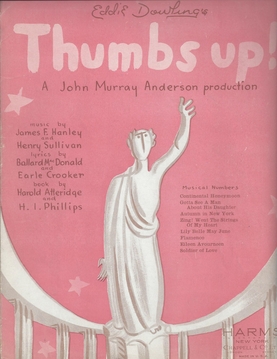
Thumbs Up! is a musical revue in two acts, with book by H. I. Phillips, Harold Atteridge, and Alan Baxter. The show had songs with lyrics by Ballard MacDonald and Earle Crooker and music by James F. Hanley and Henry Sullivan. Additional lyrics by Karl Stark, Ira Gershwin, John Murray Anderson, Irving Caesar, Jean Herbert, and Vernon Duke and additional music by Vernon Duke, Gerald Marks, and Steve Child. The show was produced by Eddie Dowling at the St. James Theatre. The revue opened on December 27, 1934.

Look, Ma, I'm Dancin’! is a musical comedy in two acts with a book by Jerome Lawrence and Robert E. Lee, and music and lyrics by Hugh Martin. It was produced on Broadway in 1948.
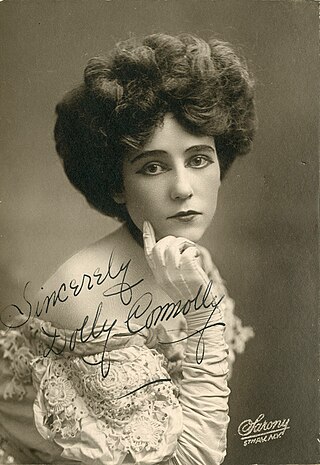
Dolly Connolly was a performer in vaudeville and musicals in the United States. She married composer and pianist Percy Wenrich. They were headliners in major vaudeville circuits. She recorded on Columbia Records and recorded a duet on Victor Records.
The Billionaire is a musical in three acts with music by Gustave Kerker, and both book and lyrics by Harry B. Smith. The show was written with the backing of producers Klaw and Erlanger and was made specifically for the talents of Jerome Sykes who portrayed "The Billionaire", John Doe. The action of the musical begins in Nice, France during Carnival where the billionaire Sykes meets a young American girl, Pansy Good, studying to be an actress. Impressed with her talents, he buys her Doe's Theatre in New York City and establishes her as a star. Later, Doe attempts to ride a horse in a race at the Longchamp Racecourse in Paris, but is too fat to succeed. Pansy rides the horse instead and wins the race.
Coming Thro' The Rye is a "satiretta" or musical in two acts with both lyrics and book by George V. Hobart and music by A. Baldwin Sloane and J. Sebastian Hiller.
The White Hen is a musical in two acts with music by composer Gustav Kerker, a book by Roderic C. Penfield, and lyrics co-authored by Penfield and Paul West. Set in Tyrol, Austria, the story takes place at an inn, 'The White Hen', owned by Hensie Blinder. The musical begins after Blinder returns from a trip to Vienna in which he engaged a matrimonial agency to help him find a wife. Upon his return to the inn, several women arrive in response to the advertisement placed by the agency and a comedy of errors ensues; including Blinder mistakenly believing he has committed the crime of bigamy.
Paul West was an American playwright, lyricist, newspaper editor, journalist, screenwriter, author, and talent agent. After working as a journalist in Massachusetts from 1888 to 1892, he began his career in the theatre as a press representative for Charles H. Hoyt; followed by a season as the business manager for the opera singer and actress Camille D'Arville and the comedian Frank Daniels. From 1898 to 1911 he worked on the editorial staff The New York Sunday World during which time be began a career as a prolific lyricist for both Broadway musicals and Tin Pan Alley publishers of popular song; publishing more the 500 songs during his lifetime. He also worked as a playwright, penning both plays and the books for several musicals. More than 15 of his stage works were mounted on Broadway between the years 1902–1913. In 1904 his children's book The Pearl and the Pumpkin was published; a work which he later adapted into a 1905 musical.
Fritz in Tammany Hall is a musical in three acts with music by Jean Schwartz, lyrics by William Jerome, and a book by John J. McNally. The musical takes place in 1905 in New York City and on Long Island. It was a political spoof of New York City politics of that period.















